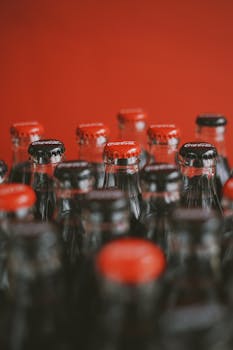
**
The beverage giant Coca-Cola is embroiled in a significant class-action lawsuit alleging deceptive labeling practices regarding the sugar content in its popular drinks. The lawsuit, filed on behalf of numerous consumers, claims Coca-Cola intentionally misleads consumers about the actual sugar content and health implications of its products through its marketing and labeling. This development comes amidst growing public health concerns surrounding sugar consumption and increased scrutiny of food and beverage industry marketing tactics. The case, which is likely to set a precedent for similar lawsuits against food and beverage companies, promises a lengthy legal battle and could have far-reaching consequences for the industry.
Coca-Cola's Misleading Labels: The Heart of the Lawsuit
The core allegation in the class-action lawsuit centers around Coca-Cola's labeling of its various beverages. Plaintiffs argue that the company's labeling practices are deliberately vague and obfuscate the high sugar content present in many of their popular products. They contend that phrases like "diet," "light," or "zero sugar" are misleadingly used, implying health benefits that aren't fully substantiated. The lawsuit specifically cites the use of smaller font sizes for crucial nutritional information, such as the grams of sugar per serving, and the strategic placement of this information on the packaging. This, the plaintiffs argue, actively discourages consumers from readily understanding the true sugar content.
This strategy, according to the lawsuit, is part of a larger corporate strategy to downplay the significant health risks associated with excessive sugar consumption. The plaintiffs claim that Coca-Cola is knowingly profiting from this misleading marketing, capitalizing on consumers' desire for healthier options without providing genuine transparency. The lawsuit also points to the company's marketing campaigns, suggesting that these campaigns reinforce the misleading impression created by the labeling.
Key Allegations Against Coca-Cola:
- Deceptive labeling: Use of misleading terms to minimize the perception of sugar content.
- Obscured nutritional information: Placement and font size of sugar content information designed to be difficult to see.
- Misleading marketing campaigns: Advertisements promoting health benefits that aren't fully supported by the product's sugar content.
- Unfair competition: The lawsuit suggests that Coca-Cola's practices give them an unfair advantage over competitors who provide more transparent labeling.
The Potential Impact: A Watershed Moment for the Beverage Industry?
The outcome of this class-action lawsuit could significantly impact the entire beverage industry. If successful, it could force Coca-Cola and other companies to revise their labeling practices, leading to greater transparency regarding sugar content. This would involve stricter regulatory compliance and a potential shift towards clearer, more easily understandable nutrition labels.
The lawsuit also highlights the growing pressure on food and beverage companies to align their marketing practices with public health concerns. Consumers are becoming increasingly aware of the link between sugar consumption and various health issues, such as obesity, type 2 diabetes, and heart disease. This heightened awareness has driven increased demand for healthier options and greater transparency from food manufacturers. The Coca-Cola lawsuit embodies this growing consumer activism and its potential impact on corporate practices.
Potential Outcomes of the Lawsuit:
- Changes to product labels: Coca-Cola may be forced to redesign its labels to more clearly display sugar content.
- Financial penalties: The company could face substantial fines if found guilty of deceptive labeling.
- Changes in marketing strategies: Coca-Cola might be compelled to revise its marketing campaigns to avoid misleading consumers.
- Precedent-setting legal ruling: The case could set a legal precedent for future lawsuits against companies employing similar labeling practices.
Coca-Cola's Response and the Road Ahead
Coca-Cola has yet to issue a detailed response to the specific allegations in the class-action lawsuit. However, the company has historically defended its labeling practices, stating that they adhere to all relevant regulations and industry standards. The company is likely to argue that consumers are reasonably able to understand the nutritional information provided on their packaging. However, given the rising concerns about sugar consumption and the increasing scrutiny of corporate marketing practices, the company's defense may prove challenging.
The legal battle ahead is expected to be lengthy and complex. Both sides will present evidence to support their claims, and the court will ultimately decide on the validity of the allegations. The outcome will not only affect Coca-Cola's bottom line but also serve as a benchmark for other food and beverage companies, prompting them to re-evaluate their labeling practices and marketing strategies. This lawsuit underscores a growing trend toward greater accountability and transparency within the food industry, driven by consumer demand for healthier products and clearer information. The "health halo" effect of vague and arguably deceptive labels may soon be a thing of the past.
Keywords:
Coca-Cola lawsuit, class-action lawsuit, misleading labels, sugar content, deceptive marketing, food labeling, beverage industry, public health, consumer protection, nutritional information, health halo effect, diet drinks, zero sugar drinks, light drinks, litigation, corporate accountability, transparency in food industry, sugar consumption, misleading advertising.




















